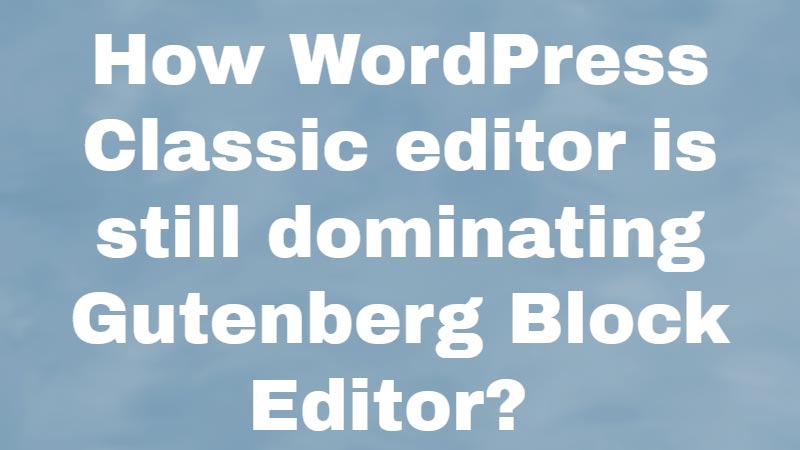Do you think that WordPress Classic Editor is still dominating Gutenberg Block Editor? Let’s see the difference between Classic Editor vs Gutenberg Block Editor.
WordPress is the most popular content management system in the world, powering over 40% of all websites. Since its inception in 2003, WordPress has undergone several updates and upgrades, including the introduction of the Gutenberg block editor in version 5.0. However, despite the introduction of the new editor, the Classic editor continues to dominate WordPress usage.
The Gutenberg block editor was introduced in December 2018 and is designed to offer users a more intuitive and flexible editing experience. Instead of using a single text box, Gutenberg allows users to create content using individual blocks of text, images, videos, and other media elements. The new editor also offers drag-and-drop functionality, which simplifies the process of arranging and rearranging content on a page.
Despite the many benefits of the Gutenberg editor, many WordPress users still prefer the Classic editor. Here are some reasons why:
Familiarity
Many WordPress users have been using the Classic editor for years and are familiar with its interface and functionality. Switching to a new editor can be a daunting task, particularly for those who are not comfortable with technology.
Simplicity
The Classic Editor is straightforward and easy to use. Users can create and publish content quickly and easily without needing to navigate multiple menus and options. The simplicity of the Classic editor is particularly appealing to bloggers and small business owners who may not have the time or resources to invest in learning a new editor.
Plugins and Themes Compatibility
The Classic Editor is compatible with a vast number of plugins and themes. Many of these plugins and themes have been developed specifically for the Classic editor and may not be compatible with the Gutenberg editor. This can make it challenging for users who rely on these tools to create and publish content.
Content Conversion
Many WordPress websites were created using the Classic editor. Switching to the Gutenberg editor requires converting all existing content to the new format. This can be a time-consuming and challenging process, particularly for websites with a large number of pages.
Accessibility
The Gutenberg editor is not accessible to all users, particularly those who rely on screen readers or other assistive technologies. This can limit the number of users who can create and publish content using the new editor.
Compatibility with Shortcodes
WordPress Classic editor is also preferred because it allows users to use shortcodes in their content. Shortcodes are small snippets of code that allow users to add specific functionality to their content. For example, a shortcode can be used to add a contact form, a social media button, or a custom widget to a page. Many WordPress plugins and themes rely on shortcodes to provide additional functionality, and the Classic editor is compatible with them.
Technical Limitations
The Gutenberg editor is more technically demanding than the Classic editor. It requires more server resources, and it may not perform well on older hardware or slower internet connections. This can make the editing experience slow and frustrating for users.
Time and cost
Switching to the Gutenberg editor may require a significant investment of time and money. Users may need to update their plugins and themes or hire a developer to assist with the transition. For some users, the benefits of the Gutenberg editor may not outweigh the costs.
Workflow
Some users find that the workflow of the Gutenberg editor is less intuitive than the Classic editor. The need to create content using individual blocks can be cumbersome and time-consuming, particularly for users who are accustomed to creating content in a more streamlined way.
Conclusion
Finally, we have mentioned some great differences between the classic editor and vs Gutenberg Block editor.
Despite the many benefits of the Gutenberg block editor, the Classic editor continues to dominate WordPress usage. Users appreciate the simplicity and familiarity of the Classic editor, as well as its compatibility with a vast array of plugins and themes. The Classic editor also allows users to use shortcodes, which is an essential feature for many WordPress users.
However, as more developers create Gutenberg-compatible plugins and themes, it’s possible that the balance will shift towards the Block Editor over time.
Now, over to you,
Do you think the classic editor still dominates the Gutenberg Block editor?
Are you using Classic Editor or Gutenberg Block Editor?
Please let us know your thoughts and follow us on Facebook and Twitter.
